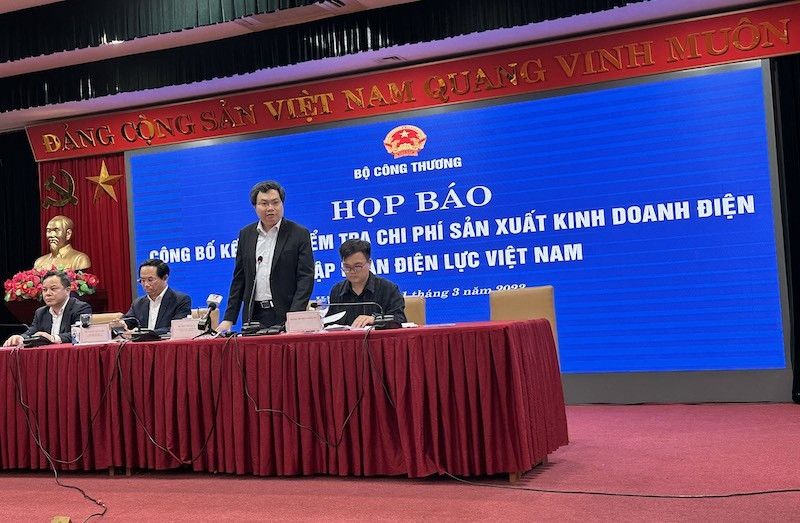
The assessment of power generation and business expenses throughout the years is based on records supplied by EVN and its member organisations.
The MoIT representative stated that the inspection of electricity production and business costs over the years is based on documents provided by EVN and its member units, including a report on electricity production and business activities audited by Deloitte Vietnam; consolidated financial statements after audit of EVN; financial statements audited by independent auditors of thevparent company and its member units; electricity purchase and sale contracts between EVN and power plants; and separate the expenses of energy production, transmission, retail distribution, auxiliary services, and industry administration.
The entire cost of electricity production and business was $17.86 billion in 2021 and $21.02 billion in 2022, including the cost of power generation and transmission, electricity distribution and retail, and auxiliary and management industries.
Accordingly, the cost of electricity production and business in 2021 was 7.9 cents per kWh, an increase of 1.84 per cent over 2020; in 2022, the cost of electricity production and business was 8.7 cents per kWh, an increase of 9.27 per cent over 2021.
Particularly, the overall cost of power production in 2022 was $15.57 billion, which corresponds to 7.2 cents per kilowatt-hour according to commercial electricity rates. In 2022, the cost of power production rose by more than $3.1 billion compared to 2021.
The entire cost of power transmission exceeded $718 million, which is comparable to 0.3 cents per kWh for commercial transmission. The entire cost of power distribution and retail was $2.67 billion, which translates to 1.1 cents per kilowatt-hour for commercial electricity.
The overall cost of the ancillary-management stage was $69 million, which is comparable to 0.03 cents per kilowatt-hour in terms of commercial power costs. $16.5 million was the total compensation for power generation and business expenditures in communes and island districts that were not yet linked to the national grid.
Director of the Energy Regulatory Authority of Vietnam Tran Viet Hoa said that EVN lost more than $1.55 billion in 2022 due to losses in power production and commercial outcomes.
In 2022, the income from power generation and commercial operations was $428 million. Overall electricity production and business operations in 2022, as well as activities connected to electricity production and business (including revenue from financial activities and earnings from the sale of reactive power and interest on deposits), resulted in a $1.12 billion loss for EVN in 2022 (excluding income from other production).
The remainder of the exchange rate difference made under the power purchase and sale contracts of the generating units in 2019 with a value of more than $128 million; the exchange rate difference made under the power purchase agreement in 2020 with a value of approximately $195 million; and the exchange rate difference made under the power purchase agreement in 2021 with a value of approximately $195 million.
Nguyen Xuan Nam, deputy general director of EVN, said during the press conference that the group's financial situation is very precarious in light of such a significant loss. As a result, EVN has also requested and filed with MoIT, competent authorities, and the government a price adjustment for electricity since input costs for electricity generation rose significantly in 2022.
The price index of coal, gas, and oil, particularly coal, soared by more than three times and often by four or five times, while the price of oil jumped by two times. This is the primary cause of the high cost of power production.
Regarding the increase in electricity prices, Hoa stated that according to Decision 24/2017/QD-TTg on the mechanism to adjust the average retail price of electricity, it will be based on input parameters and the electricity price will be adjusted if the change causes the average electricity price to increase by 3 per cent or more.
In the past, EVN has produced plans to modify energy rates and presented them to the MoIT and the Ministry of Finance, for assessment. EVN's plans were evaluated and reported to the prime minister in accordance with legislation.
Source: VIR